- Home
- Richard Lee Byers
Whisper of Venom botg-2 Page 7
Whisper of Venom botg-2 Read online
Page 7
The Threskelans were sending something in the dark. Something that could make its way to the top of Soolabax’s walls, find lone guards, and rip them apart.
It was only a minor problem in the overall context of the siege. But, in what Oraxes believed to be a rare instance of accord, Aoth and Lord Hasos both wanted it stopped. To that end, they’d decided to set a trap. The bait was one of the ablest combatants in the Brotherhood of the Griffon, who was nonetheless counting on Oraxes and the other men in the turret to rush to his aid.
Oraxes suspected killing the killer, who-or whatever it was, was likely to prove considerably more difficult than using his magic for petty theft to survive in Luthcheq. But it was apt to be more interesting too.
Suddenly the sentry cried out and hefted his spear. A bare instant later, something big, dark, and eight-legged swarmed over the parapet. It moved fast, in a swirl of shadows blacker than the night.
The sentry jabbed with the spear, but it glanced off his attacker’s shoulder. The spider thing-which, Oraxes observed, had a horned head and clawed feet more closely resembling a lizard’s-spewed something that instantly congealed into strands, which wrapped around the warrior, sizzled, and smoked. He cried out and strained to break the bonds. The spider thing opened its slavering, steaming jaws to bite.
Oraxes rattled off words of power, jerked his right hand through a jagged pass, then pointed. A serpent made of bright, crackling lightning leaped from his fingertip and flew. It plunged its fangs into the spider thing’s flank and vanished in a flash.
For a moment, the creature convulsed. It gave the sentry time to struggle free of his gluey, blistering restraints.
Meanwhile, the men-at-arms in the turret scrambled out onto the wall walk and discharged their crossbows. Then they drew their swords and advanced on the beast.
Which didn’t seem to mind that it was facing half a dozen foes instead of one. In fact, it sprang to meet them. A toss of its head and horns hurled the first mercenary crashing back against the next in line.
Oraxes looked through the turret window for a clear line to the spider thing. He couldn’t see one. The mercenaries were in the way.
He scurried out onto the walkway. It didn’t help.
He told himself that the soldiers might not need any more magical aid, but saw immediately that it wasn’t so. The same problem that was hindering him could easily prove to be their downfall. The wall walk was just too narrow for them all to assail the spider thing at once, and they were no match for it two and three at a time. It tore away mail and flesh with a snap of its jaws, spun to spit more acidic strands at the warrior it had first entangled, then whirled again to rip away another piece of the man it had just bitten, before the poor bastard had even finished falling down.
Oraxes climbed up onto a merlon. It was a step in the right direction, but not good enough. He swallowed and moved to the outer edge of the stone block.
He felt the possibility of losing his balance and falling like a dizzying thinness in the air. He also felt the ghostly stab of the arrows the enemy might loose at a man standing in such an exposed position. But he finally had a clear shot, so he stayed where he was and recited an incantation.
Force flared from his outstretched hand. It whipped the spider thing’s head all the way down to crack against the wall walk like a blow from an invisible hammer. Before the creature could raise it and resume an aggressive posture, two warriors landed sword cuts.
Unfortunately, that wasn’t enough to finish the spider thing. It lunged again, horns stabbing, jaws snapping. So Oraxes raked it with a flare of yellow fire.
It snarled and sprang back over the parapet. For an instant, Oraxes assumed it had decided to flee. Then he saw that it was actually scuttling horizontally along the wall faster than a man could sprint. Coming for the foe who was hurting it the worst.
Fear turned Oraxes’s bowels to water, but he knew that if he froze or flinched, he’d die. He shouted words of power, and, as the thing turned to charge straight up at him, he thrust both arms down at it with all the strength in his body.
Fist-sized hailstones materialized in midfall, clattered and thudded against the spider thing, and knocked it off the wall. It fell and smashed against the ground.
Oraxes felt relief until he realized that his last, excessively forceful mystic gesture had shifted his center of gravity. He was toppling outward and about to plunge down right on top of the foe.
A hand grabbed him by the belt and hauled him backward. Trembling, he climbed back down onto the wall walk.
Once there, he and the sellsword who’d pulled him to safety looked down at the creature. It wasn’t moving, and the seething gloom that had shrouded it was gone. Which paradoxically meant that despite the distance, Oraxes could see it about as well as before.
The sellsword panted. “That was good work.”
The remark made Oraxes feel awkward, which was something he generally hated. But it wasn’t so bad this time. “We were all beating on it, I guess. We should get the men who are hurt to the healers.”
“I know we’re intent on winning the war against Threskel,” the burly, white-haired merchant said, his breath scented with brandy. He’d evidently served in the navy when he was younger and, as was the Chessentan fashion, still wore his collection of gleaming medals stamped with anchors, sea serpents, and other nautical emblems looped around his neck. “But I ask you, have we forgotten all about the filthy pirates?”
“I’m sure His Majesty hasn’t,” said Jhesrhi, marveling that the rich, self-important old man, who’d probably spent his whole long life despising arcanists, had sought her out for a conversation. “But it won’t do much good to protect our shipping and harbors if we lose the rest of the realm while we’re accomplishing it.”
“That’s sound thinking as far as it goes,” the merchant said. “But still, if the most important trading vessels could travel in convoy with a proper escort, it would benefit Chessenta immensely.”
Jhesrhi assumed that by “the most important trading vessels,” he meant the fleet he owned himself. Amused, she said, “If you care to request an audience, I imagine His Majesty will at least listen to your proposal.”
The shipping magnate beamed as though her response all but guaranteed success. Who knew? In the oblique parlance favored by courtiers, maybe it did. “Thank you, lady. Rest assured I won’t forget.”
Jhesrhi glanced out the casement at the western sky, gauging the position of Selune and the glittering haze of tears that forever trailed the goddess across the firmament. With a twinge of reluctance that surprised her, she decided it was time to leave the party.
She took a final look around. Tchazzar had commanded that mementoes of his past campaigns be placed on display in a hall in the War College to inspire martial ardor in his subjects, and the court was attending a private viewing. Some of the trophies were functional arms and armor, others a pavilion, captured banners, and obsolete maps.
For the most part the lords and merchants paid little attention to them. They were too busy talking. To Tchazzar, resplendent in crimson and gold, if he chose to favor them with his attention. Or to Halonya, more gaudily robed than ever, her entourage of newly anointed priests hovering in attendance, as a second choice.
Or, Jhesrhi suddenly wondered, to herself? Now that she thought about it, she hadn’t lacked for companionship over the course of the evening. Other courtiers loitered nearby, waiting to take the place of the elderly sea trader, and they looked rueful now that something in her demeanor told them she meant to go.
For some reason that made her blush, which in turn annoyed her. “I may be back,” she said. “If I can.” She turned and strode away.
She had to climb stairs to reach her apartments-which, despite the exertion involved, was a mark of Tchazzar’s favor. The finest and most coveted suites in the citadel were near the top, where the view looking out over Luthcheq was at its most spectacular. She nodded to the sentry the monarch had insisted on posting at
her door, then went inside.
A servant had already lit a fire in the hearth. She kneeled down and traced a star-shaped but asymmetrical figure on the floor. Her fingertip left lines of yellow phosphorescence.
When the sigil was done, she rose and took her staff in both hands. The rod wasn’t alive, but it possessed a sort of quasi consciousness, and it always yearned to create and manipulate fire. She could feel its eagerness when it sensed that was her intent.
She recited words of power while shifting the staff around. First she held it vertically to her right, then in the same attitude on her left, then horizontally over her head. Together with the floor, the three positions defined a rectangle. Or, as she imagined it, a window.
She wasn’t adept at long-distance magical communication. Her talents lay elsewhere, and the same was true of Aoth. But they both possessed some mastery of fire. And since all fires were in a mystical sense the same fire-manifestations of the same cosmic principle and essential force-if they prearranged a time, they could sometimes use flame to talk to each other.
A tapestry started to smoke, and she silently commanded it not to ignite. Then the blaze in the hearth leaped higher. Dimly at first, then more clearly, she spied Aoth and Gaedynn-or shrunken images of them-standing on the far side of the flames. Spear in hand, Aoth was standing and making magic in much the same fashion as herself. Looking relaxed and self-possessed as a cat, Gaedynn sprawled in a chair with a cup in his hand and one long leg thrown over the armrest.
The archer leaned forward and peered. “Is that sweet Lady Firehair herself descended from the heavens to speak to us? Or have you acquired even more new finery?”
Jhesrhi scowled. “These are wizard’s robes, not some useless gown.”
“But not especially practical for the field either,” Gaedynn said. “Are those garnets or rubies in the flame pattern?”
“Enough,” said Aoth, scowling. “I’m not holding this conduit open so you two can bicker. Jhes, I assume that if you haven’t left Luthcheq, neither has Tchazzar.”
“No,” she said. It felt like an admission, which annoyed her because it was unfair. She couldn’t order the monarch around, nor could she leave until he gave permission.
“What about the legions”-the Chessentan forces weren’t actually called that, but the Thayan way of speaking still occasionally colored Aoth’s speech-“in and around the city?”
“They haven’t moved either.”
“Curse it!” said Aoth. “Soolabax is already under siege. There’s fighting all along the border. I need reinforcements, or a dragon of my own to counter the wyrms flying out of the north. Preferably both. What’s Tchazzar waiting on?”
Jhesrhi knew Aoth’s frustration was justified. So perhaps it was her suspicion that he blamed her for the problem that made her want to defend the war hero. “He was gone a hundred years. He has a lot to sort out.”
“None of which will matter a lump of dung if Threskel overruns us,” Gaedynn drawled. “Do you think the old snake’s afraid to fight?”
She hesitated, then remembered how Tchazzar had destroyed the blight wyrm Sseelrigoth. “He’s a dragon,” she said.
“Fine,” said Aoth, a trace of the blue light in his eyes gleaming through the wavering yellow haze of the fire. “He isn’t scared, just unwise. The point is this: Gaedynn did some spying and learned that more dragons are on their way here. Fortunately not too quickly. They’re herding some other creatures along, and not all of those can fly.
“I don’t want them joining the siege,” the war-mage continued. “I want to break out, then ambush the procession before it gets here. I’ve picked out a good spot.”
“That’s a bold plan,” she said. The notion of attacking flying creatures by surprise was always problematic, and if said creatures also possessed the cunning of dragons, it compounded the difficulties. But if anyone could do it, the Brotherhood could.
“At this point,” said Aoth, “Luthcheq’s soldiers can’t get here in time to help. But Tchazzar can.”
“I’ll talk to him,” she promised, “and tell you tomorrow night what he said.”
“Good.” Aoth hesitated. “How’s Cera?” he asked gruffly. Behind him, Gaedynn grinned.
“I haven’t seen her for a couple of days,” Jhesrhi said.
Aoth’s eyes narrowed. “What? Everyone knows Soolabax is surrounded, don’t they? She wouldn’t try to return here without a flying steed to carry her.”
“Everyone knows,” Jhesrhi said. “Your messenger arrived. Now that you mention it, it’s strange, because I’ve seen plenty of Daelric.” Mostly trying fruitlessly to arrange to talk to Tchazzar without Halonya in attendance. “You’d think Cera would have accompanied him at least part of the time.”
“I’m coming down there.”
At the end of the palaver, Aoth waved his hand. Jhesrhi’s image vanished, and the leaping flames subsided to mere flickering wisps among the coals. They’d devoured most of the wood while the magic was active.
“You realize,” Gaedynn said, “this is stupid. Maybe not let’s-go-to-Thay-and-fight-Szass-Tam stupid, but stupid nonetheless.”
“Somebody has to prod Tchazzar into motion.”
“And that somebody is Jhesrhi. The drake picks his favorites, and for the moment at least she’s one of them. So if she can’t do it, you can’t either. You’ll just make yourself look bad by showing up at court when you’re supposed to be here attending to business.”
“I’ll be there attending to business.”
“It’s Cera, isn’t it? You only just met the wench. How can she mean so much to you?”
“You’re one to talk.”
One corner of Gaedynn’s mouth quirked upward. “I have no idea what you mean by that. But if I did … Never mind. Just because Jhesrhi hasn’t seen her for a day or two, why do you leap to the conclusion she’s in trouble? A vision?”
“I wish. It’s because she believes Amaunator wants her to find out what’s really behind the Green Hand murders and all the other mysteries. She urged me to help, and I refused. I told her fighting the war was my proper concern.”
“Which was sensible. But you’re afraid she took advantage of being in Luthcheq to snoop around by herself and has come to grief because of it.”
“Pretty much.”
“Then let me go look for her.”
“It may take truesight to pick up her trail. Now, I give you my word. Whether I find her or not, I won’t stay gone for long. While I’m away, you’re in command. Don’t make any big moves unless you have to. But use scouts to track those wyrms and other creatures coming down from the north. If you decide you need to go ahead and break the siege to spring the trap as planned, do it.”
It had been a long time since Aoth had seen Gaedynn succumb to consternation. “I know how to lead my bowmen and skirmishers,” the lanky redhead said. “But the whole Brotherhood?”
“You can handle it.”
“Khouryn’s still in Tymanther doing Keen-Eye only knows what.”
“That’s why you have to handle it.”
“With both you and Jhesrhi absent, there’ll be scarcely any sorcery to speak of.”
“Despite being a surly young snot, Oraxes has some power, and some sense and grit to go with it. He can help you use what magic you do have to best effect.”
“You realize Hasos won’t be happy taking orders from your lieutenant.”
“I’ll order him to obey you as he would me.” Aoth snorted. “For whatever that’s worth.”
Clad in her favorite purple robe with the silvery sigils sewn on, Nala spun her shadow-wood staff through complex figures and chanted in the secret, sibilant language the dragon god evidently preferred. As usual, her body writhed from side to side like she was a snake trying to crawl straight up into the air.
As the chant progressed, that sinuous motion became contagious. The half dozen true neophytes started doing it too.
Balasar knew why. He could feel Power buzzing around his hea
d like a swarm of flies. But because he’d resisted the temptation to yield to his dragon nature during his initiation, it couldn’t get inside.
He just had to hope Nala couldn’t tell. He shifted back and forth like his fellows in an effort to keep her from taking a closer look at him. Which made him feel like a jackass with spectators watching.
Up until then, the Platinum Cadre had conducted nearly all its rituals and other activities removed from the hostile public eye. But since the cult had gained a measure of acceptance, Nala and Patrin had decided to conduct the trial of faith in a corner of the shaded, breezy Market Floor-with thick columns along the edge of the platform, the prodigious bulk of the City-Bastion suspended overhead, and the cries of vendors sounding not far away.
Nala twirled the staff faster and faster. Her voice rose until she was all but screaming. Then, on the final word of her chant, she whipped down the rod to rest in front of her with the butt exactly equidistant between her feet. Except for the constant boneless shifting, she stood motionless. Even to Balasar, who’d learned sword forms from some of the most exacting masters-at-arms in Tymanther, the instantaneous transition from frenzy to stillness was impressive.
Nala scrutinized the recent converts. Perhaps her gaze lingered on Balasar for an extra moment. More likely it was just his imagination.
“You’re ready,” she declared. “Arm them, Sir Patrin.”
The paladin with his deep blue surcoat and clinking beard of silver chains opened a wooden box and started handing out knives. Balasar felt a pang of dismay.
Which, he supposed, had its comical side. He’d fought a topaz dragon and its strange, formidable minions on the journey down from Chessenta. And he was worried about a pen full of pigs?
Well, yes. Because they were the enormous, savage variety sometimes called dire boars, and an unarmored knife fighter-no matter how skilled-would be at a substantial disadvantage. Especially in the somewhat cramped confines of the pen, where an animal could pin him against the fence.

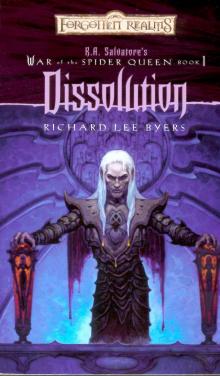 Dissolution
Dissolution Arkham Horror- Ire of the Void
Arkham Horror- Ire of the Void The Haunted Lands: Book II - Undead
The Haunted Lands: Book II - Undead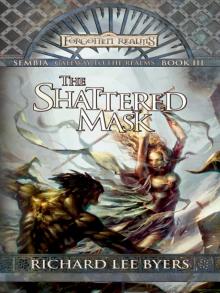 The Shattered Mask
The Shattered Mask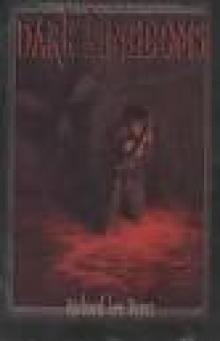 Dark Kingdoms
Dark Kingdoms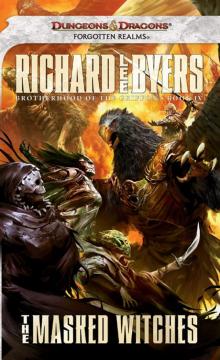 The Masked Witches: Brotherhood of the Griffon, Book IV
The Masked Witches: Brotherhood of the Griffon, Book IV The Plague Knight and Other Stories
The Plague Knight and Other Stories Unclean: The Haunted Lands
Unclean: The Haunted Lands The Captive Flame: Brotherhood of the Griffon • Book 1
The Captive Flame: Brotherhood of the Griffon • Book 1 The Taste of Waterfruit and Other Stories (Story Portals)
The Taste of Waterfruit and Other Stories (Story Portals)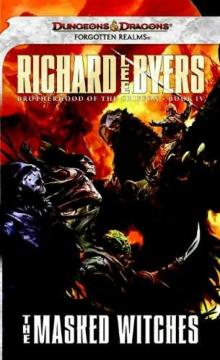 The masked witches botg-4
The masked witches botg-4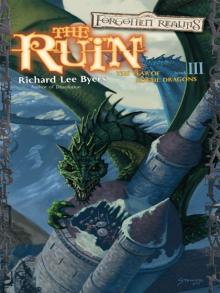 The Ruin
The Ruin The Spectral Blaze botg-3
The Spectral Blaze botg-3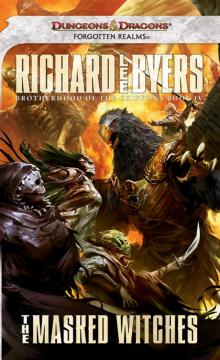 The Masked Witches
The Masked Witches Blind God's bluff bf-1
Blind God's bluff bf-1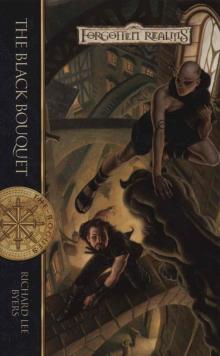 The Black Bouquet r-2
The Black Bouquet r-2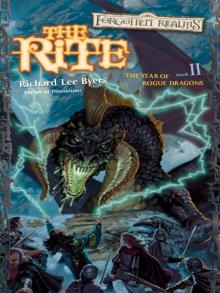 The Rite
The Rite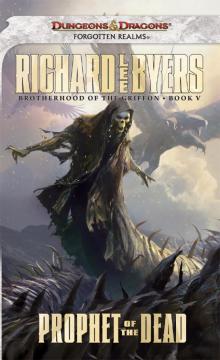 Prophet of the Dead: Forgotten Realms
Prophet of the Dead: Forgotten Realms The Shattered Mask s-3
The Shattered Mask s-3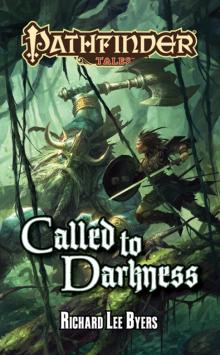 Called to Darkness
Called to Darkness Undead hl-2
Undead hl-2 Blind God's Bluff: A Billy Fox Novel
Blind God's Bluff: A Billy Fox Novel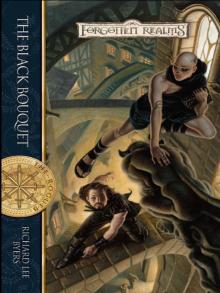 The Black Bouquet
The Black Bouquet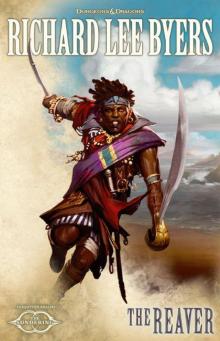 The Reaver
The Reaver The Spectral Blaze: A Forgotten Realms Novel
The Spectral Blaze: A Forgotten Realms Novel Queen of the Depths
Queen of the Depths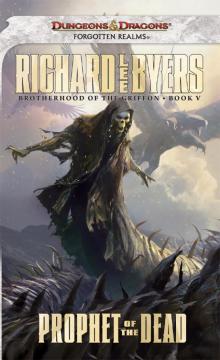 Prophet of the Dead botg-5
Prophet of the Dead botg-5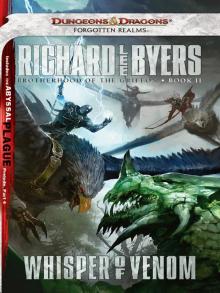 Whisper of Venom: Brotherhood of the Griffon, Book II
Whisper of Venom: Brotherhood of the Griffon, Book II The Captive Flame botg-1
The Captive Flame botg-1 The Haunted Lands: Book III - Unholy
The Haunted Lands: Book III - Unholy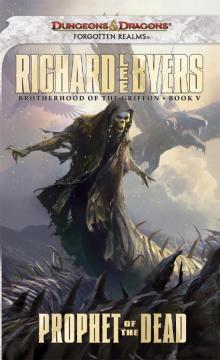 Prophet of the Dead
Prophet of the Dead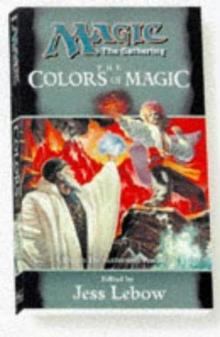 The Colors of Magic Anthology (magic: the gathering)
The Colors of Magic Anthology (magic: the gathering) Unholy hl-3
Unholy hl-3 Unclean hl-1
Unclean hl-1 Blind God's Bluff
Blind God's Bluff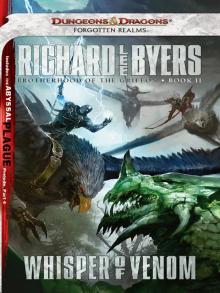 Whisper of Venom botg-2
Whisper of Venom botg-2 The Spectral Blaze
The Spectral Blaze